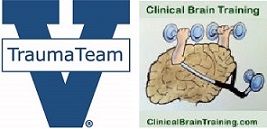Since so many people reading this could be working in fire and EMS to get prepared for medical school, I thought I would take a little time and talk about my thoughts on this. For the people reading clinicalbraintraining.com who are in med school already, go back to studying or go see your patients.
First, my qualifications to talk about this. Other than being an MD for 24 years, and getting into med school along with my wife, my wife and I were both on the admissions committee at MCV/VCU in our senior years and participated completely: evaluation of applications, interviewing applicants, and sitting in and voting on final decisions. Also, I have worked with hundreds of medical students over these 22 years, and I always make a point of finding out: where you went to college, what your major was, and your path to medical school. From this, I have been able to draw many conclusions about how to become a physician. I have little or no experience with DO admissions, but in general, everything is fairly similar, except your GPA and MCAT scores can be lower (about 0.2 for GPA, and about 15% lower for MCATS, these are estimates). Also, all my sons want to be physicians, so I have had to relearn some of the statistics and strategies.
Lets go through the factors and my strong opinions about them. If you are medical student or college student and think I’m wrong, you are probably wrong. If you are a Dean of Admissions at a MD or DO school and think I’m wrong, please write in and tell me where I am incorrect so the readers get the best information.
College choice: In my opinion, meaningless. There is absolutely no reason to choose an Ivy league school over a state school solely for the purpose of improving your chance of getting in. Can you get into med school from VCU? Absolutely. Can you get in from Elon college? Absolutely. Can you get in from Liberty University? Absolutely. I have worked with multiple medical students at UVA from all these colleges. In fact one of the physicians I respect most went to community college for 2 years, then finished his degree , and was accepted at multiple places. Med school costs money, and debt hurts. While there may be other solid reasons to go to Harvard over Penn State, improving your chances at med school admissions is a very weak one. Spending $50,000/year at Princeton vs spending $15,000 at Ohio State will increase your debt by $140,000 BEFORE YOU EVEN BEGIN MEDICAL SCHOOL. And then you add the debt from medical school. If you know you want to be a physician, go to a solid school and do well and you’ll get in. If you go to Yale and have a 3.2 GPA and get a 21 on your MCATS will you get into med school? You probably have less than a 15% chance of getting in. If you go to Iowa Stae and have a 3.7 and a 28 on the MCATS, you have a 60% chance. Nuff said
Grades: You only need to remember one thing: GPA, GPA, GPA, etc. What does it mean to a med school admissions committe if you have a 3.2? It means you have trouble gathering information, processing it, and delivering that information when asked for. What do you do in med school? Gather information, process it, and deliver it. What do you do as a doctor? Gather information, process it, and deliver it. If you cant do that, you’re screwed. Do med schools care if you’re taking the high level organic chem, vs the low level “pre-med” organic chem? If someone told you they do, think of this: that admissions committee sees 10,000 applications, often they have a GPA cutoff before they even open your file (usually around 3.1-3.2) so you have a 3.0, you’re gone and they wont open your file and know what course you took. Lets say they dont filter and the file makes it to a reviewer, do you actually think that the admissions committee member knows the difference between organic chem 2301 at Harvard and organic chem 252 at UVA??? They have no idea. Maybe if youre from the same institution, they have some concept of the numberic of honors courses, but invariably they dont. So get as high a GPA as humanly possible, especially your science GPA.
I recommend you take the lowest level science courses you can for pre-med unless you are CERTAIN you can get an A. Talk to people who have taken the higher level course, look at the grade distribution, go to the web and research. If 10% of students get an A, there’s a 90% chance YOU WON’T. Will it make a difference as to the type of doctor you will become? No. Will it prepare you better for med school? Simple answer, no. More complex answer – maybe, but if you dont get into med school, you’ll never know if it prepared you better.
Next post – extracurricular activity and medical experience.



 Subscribe in iTunes
Subscribe in iTunes